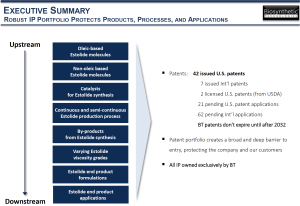IP Strategy for Startups: Q&A with IP Expert Jeremy Forest
For hard tech startups, having a strong IP strategy can make the difference between success and failure, especially if racing to develop solutions in a competitive space. The Heritage Group’s VP, Strategy and M&A, Jeremy Forest, has decades of experience in this area and recently sat down with HG Ventures’ Jon Schalliol to share some of his wisdom.
Jon Schalliol: Jeremy, intellectual property is a very specialized field; how did you get into it?
Jeremy Forest: My journey into IP started with a somewhat unique background in science and law.
 I studied biochemistry as an undergrad and went on to graduate school to focus on medicinal chemistry and organic synthesis. But as I got deeper into my research, I realized that the bench wasn’t where I wanted to spend my career. I became more interested in the business side of biotech, which led me to law school, where I focused on intellectual property and patent law.
I studied biochemistry as an undergrad and went on to graduate school to focus on medicinal chemistry and organic synthesis. But as I got deeper into my research, I realized that the bench wasn’t where I wanted to spend my career. I became more interested in the business side of biotech, which led me to law school, where I focused on intellectual property and patent law.
After law school, I spent about five years in a big IP law firm, primarily working in patent prosecution and litigation in the biotech and pharma sectors. It was a demanding job, but it gave me a solid education in IP.
Eventually, I transitioned out of law firm life and into the startup world. In 2011, I joined a clean tech startup called Biosynthetic Technologies, where I was responsible for building out their IP strategy and expanding their patent portfolio. That experience set the stage for my current role at The Heritage Group, where I manage IP strategy across various projects, including M&A and supporting HG Ventures.
Jon: I remember looking at Biosynthetic Technologies in 2016, and being absolutely floored by the attention to detail around the IP.
I pulled up an email from that time that stated they had more than 40 patents issued and 83 patents pending, with protection running into the mid-2030s. That level of patent protection—covering molecule structures, products, processes, and applications—was striking. It was a key element in why we felt it made sense to move forward with the company. Without that IP strategy, I am not sure we would have considered the investment. It was one of those moments where you realize how crucial a strong IP foundation is in determining the future success of a company.
Jeremy: Yes, having such a comprehensive IP strategy in place was critical. The strength of the patent portfolio, covering everything from molecule structures to processes, really set Biosynthetic Technologies apart. It’s the kind of solid foundation that not only protects the company’s innovations but also gives investors confidence in the long-term value and defensibility of the business.

Why is an IP Strategy So Important?
Jon: Jumping from a big law firm into a startup must have been a pretty big shift. Based on all that experience, can you share your thoughts on why a well-thought-out IP strategy is so crucial for startups?
Jeremy: An IP strategy is absolutely critical for startups, particularly for those in fields like biotech, clean tech, or any industry where innovation is key. The reality is, your IP is often the most valuable asset your company has—especially in the early stages before you’ve built out other tangible assets.
For example, when I joined Biosynthetic Technologies, the company had some novel technology, but the core patents were set to expire in a few years. We knew that if we were going to create value, we needed to expand our IP portfolio quickly. This meant filing new patents to cover not just the original technology but also enhancements, scaled production processes, and end-use formulations. Our strategy was to “evergreen” the original patents, effectively extending their protection and ensuring that we could keep competitors at bay. This robust IP portfolio was a key reason why the company eventually attracted investment from HG Ventures.
Key Considerations in Developing an IP Strategy
Jon: That makes a lot of sense. For founders who are just starting to think about their IP strategy, what are some key considerations they should keep in mind?
Jeremy: Founders need to understand what makes their technology unique and how it differentiates them from what’s already out there.
This means doing your homework—conducting thorough market research and understanding the competitive landscape.
Another crucial step is ensuring that your IP is defensible. This involves more than just filing patents; it’s about ensuring those patents are well-drafted and cover the most critical aspects of your technology.
Also, consider the potential for ‘freedom to operate’ issues—meaning you need to make sure your product or technology doesn’t infringe on existing patents. This can be tricky, especially for early-stage startups with limited resources, but it’s vital.
Founders should also be aware that IP strategy isn’t a one-time task. It’s something that needs to be revisited and adjusted as your company grows. As you develop new products or enter new markets, your IP strategy should evolve accordingly.
IP and the Due Diligence Process
Jon: That’s great advice. As you know, IP is very important to us in companies we invest in and we really value being able to bring you into the process of assessing potential investments when we need to draw on your specialist expertise, alongside that of others within The Heritage Group. Given your work with us and with startups you’ve advised, can you share a bit about the role it plays when evaluating potential investments?
Jeremy: One of the first things I look at is the overall IP strategy. A well-thought-out IP strategy can be a strong indicator that the founders understand the importance of protecting their innovations.
During due diligence, I work with the HG Ventures team to assess the scope and quality of the company’s patents, the likelihood of those patents being granted, and the strength of any existing IP. We also look for any red flags, such as potential infringements or gaps in the IP portfolio. If a company has a solid IP strategy and a well-defended portfolio, it gives us confidence that they have a defensible market position, which is critical for long-term success.
Warning Signs and Watch-Outs
Jon: In your view, what’s the biggest mistake startups make when it comes to IP?
Jeremy: I think the biggest mistake is underestimating the importance of IP from the start.
Too often, startups focus on developing their product or technology and leave IP considerations as an afterthought. This can be a costly mistake. If you don’t have a solid IP strategy in place early on, you might find yourself in a position where your technology isn’t as protected as you thought, or worse, that you’re infringing on someone else’s patents.
Another common mistake many founders make is not fully understanding the scope of their IP. It’s not enough simply to have a patent; you need to ensure that your patent covers all the critical aspects of your technology and that it’s enforceable. A weak patent that doesn’t provide real protection is almost as bad as no patent at all.
Jon: That’s good advice. I wonder, as someone who has seen both sides of the IP equation—working in a law firm and now in the corporate world—what do you enjoy most about your work?
Jeremy: I love the opportunity to work on a variety of technologies and help shape the strategic direction of the companies I work with.
Every day is different, and I enjoy the challenge of figuring out how to protect and leverage technology to create value.
I also enjoy the creative aspect of IP law—finding ways to use the legal tools at our disposal to build a defensible market position for our companies. It’s incredibly rewarding to see the impact of a well-crafted IP strategy on a company’s success.
The Future
Jon: You must often be among the first to have access to new technologies, too. Is there anything you are seeing now that you are particularly excited about?
Jeremy: I’ll be the first to admit I don’t fully understand all of the latest technological innovations in the hard tech space, but what I’ve been seeing coming through is the incredible potential of AI and machine learning, especially when applied to construction, road building, and project management.
There’s a tremendous opportunity here, not just to enhance the efficiency and quality of our work but to do so in a way that aligns with our focus on sustainability and the circular economy. Even though I’m not an expert in AI, I can see how leveraging these technologies could be a game-changer for the industry, helping us optimize resources, reduce waste, and ultimately contribute to a more sustainable future.
Jeremy Forest is VP, Strategy and M&A, with HG Ventures’ parent company, The Heritage Group, and supports the HG Ventures team in assessing and conducting due diligence on potential investments. A remote employee, Jeremy lives in Washington State, where he enjoys the great outdoors and competes in Ironman triathlons.
This Q&A provides a deep dive into the importance of intellectual property strategy for startups. Whether you’re just starting out or looking to refine your existing IP strategy, these tips can help you protect your innovations and position your company for success.

